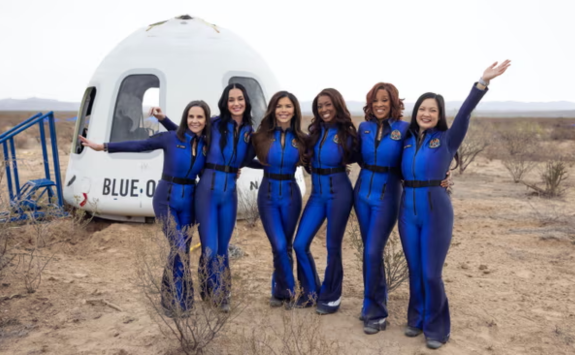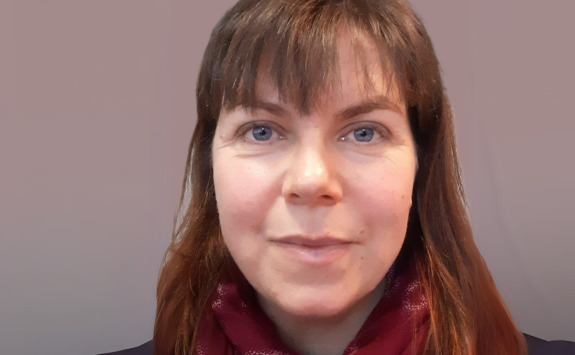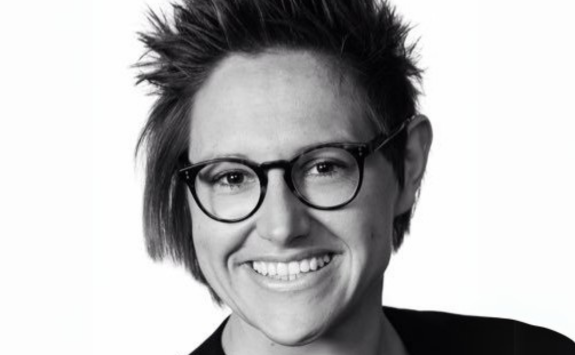“Little to do with women, and much more to do with profits”: Why the recent Blue Origin space mission crash-landed
In this blog, Newcastle University alumnae Dr Victoria Pagan and Dr Emily Yarrow share their thoughts on the recent Blue Origin NS-31 mission and consequent media fall out.
2 June 2025
An all-women crew reached the edge of outer space in Jeff Bezos’ Blue Origin rocket in April 2025, the first spaceflight since the 1960s that didn’t include any men.
But rather than the mission being celebrated, it has faced widespread criticism for its high cost, perceived environmental impact, and the lack of scientific or exploratory purpose. In this blog, Newcastle University alumnae Dr Victoria Pagan and Dr Emily Yarrow share their thoughts on the Blue Origin mission and consequent media fall out.
The Blue Origin NS-31 mission of 14 April 2025 was the first spaceflight in six decades that didn’t include any men. However, it is debatable whether the mission has achieved anything concrete for gender equality. This is not to critique the choices of the women involved, it is understandable that if offered such an opportunity one would take it.
The passengers were all decidedly interesting, highly successful women, but their successes and what these represented, or could represent for inspiration to other women and girls, were not front and centre. For example, Lauren Sanchez was reported first for being Jeff Bezos’ fiancée and secondly for her founding of a successful aviation business and her skills and experience as a helicopter pilot.
Image credit: Blue Origin Handout/EPA

For those looking deeper, it may have drawn a little attention to: Amanda Nguyen’s Nobel Peace Prize nomination and activism that resulted in the passing of the Sexual Assault Survivors’ Rights Act in 2016; Aisha Bowe’s specialist aerospace engineering skills and successful business ventures STEMBoard and Lingo; Kerianne Flynn’s film production success; and Gayle King’s award-winning journalism. Gayle King is quoted, perhaps out of context, "Space is not an either or, it's a both and, and because you do something in space doesn't mean you're taking anything away from Earth. And what you're doing in space is trying to make things better here on Earth," In one sense, she is right, but arguably their journey isn’t something of any value either in space or on Earth…
“A very short journey in a phallic mode of transport”
Lasting only around eleven minutes in duration, the Blue Origin ‘Shepard’ mission flights, named after Alan B. Shepard Jnr, the first American to enter space, have palpably little to do with women, and much more to do with profits, given places within the autonomous capsule require a deposit of around $150,000 USD and the full cost remaining speculated upon, but undisclosed.
Reducing it to its basic form, this was a very short journey in a phallic mode of transport that was pretty extraordinary, as was the view out of the window, but that is all it was. As many commentators have argued, cosmetics, outfits, bottoms, and looks in general were seized upon, which quite simply would not be the case for an all-male mission.
Cosmetics, outfits, bottoms, and looks in general were seized upon, which quite simply would not be the case for an all-male mission.
There is a reductive approach to gender in these sorts of events, reinforcing a gender binary that foregrounds a ‘proper type’ of woman. The question one must ask oneself, is whether an all-male mission of the same nature would raise similar questions and intrigue, or indeed the headline ‘six people launched in to space’ would garner the same interest?
Maybe this is part of the point? The mission itself, again which was eleven minutes in duration, raises important issues and questions about economic inequalities and environmental impacts. Any positive effects on perceptions of women in space, in our view, are offset by the tone-deaf nature of a mission ultimately created by a man, a man at the helm of a company that, allegedly, is “rife with sexism”.
The effect of media representation on gender equality
Social media can be both a blessing and a curse for men and women alike, however we know from existing research, as well as our own experiences, that women are more likely to be targeted by trolls or cyberbullies. Social media and the media more generally can and do play a critical role in the discourse surrounding gender [in]equality, and depending on the outlet can serve as effective vehicles raising awareness of gender issues, but also for the perpetuation of stereotypes and harmful misrepresentations.
Singer Katy Perry has been vilified on social media for her part in the Blue Origin mission. Whilst her participation and commentary was perhaps naïve at times and indeed perhaps influenced by bad advice, she has been subject to unjustifiable personal attacks that add to a long tradition of keeping women’s voices quiet.
Perry was foregrounded in media coverage, a firm nod to the notion that the glamour and entertainment associated with the flight was valued rather than anything more engaging or impactful around women’s representation. The judgment of women by their bodies first is seen across a range of contexts. Another headline placed ‘four other women’ behind Katy Perry and Gayle King. In testing times, entertainment is an important tonic, but the costs of this exercise seem unjustifiable.
Social media can be both a blessing and a curse for men and women alike, however we know from existing research, as well as our own experiences, that women are more likely to be targeted by trolls or cyberbullies.
A ‘giant leap’ for womankind?
Public figures and influencers play a difficult, multifaceted, and complex role in shaping perceptions of societal gender roles. In the case of the recent Blue Origin mission, there has been an unfortunate spin to imply it being some sort of ‘giant leap’. There is nothing to suggest that these women themselves were claiming anything of the sort, but rather it is arguable that the media discourse has thrust upon the mission, established and deeply entrenched gendered stereotypes.
A generous interpretation of the related narratives could be that there is something particular to the US context at play: at present there is a political narrative that positions the suppression of women’s agency, for example, rolling back of rights over women’s bodies, ambiguity of rights to vote through changes to the documentary proof of citizenship and the impact of differences between married name and birth name. A high-profile news story like this may play into a ‘women can do anything’ narrative and help shift attention away from these more worrying developments, such as the White House executive order on Diversity, Equality, and Inclusion (DEI).
Nevertheless, the Blue Origin mission did get people talking and raised a gender debate, and we remain hopeful that somewhere in the galaxy it may have served to inspire the next generation of women and girls into science, technology, engineering, and mathematics (STEM) roles or astronaut roles. Perhaps, we can instead focus on the forthcoming space mission of Dr Rosemary Coogan, who is set to become the UK’s newest astronaut to inspire the next generation of women and girls in STEM and beyond.
Somewhere in the galaxy it may have served to inspire the next generation of women and girls into STEM roles or astronaut roles.
The work is never done
The work surrounding gender equality, which is disproportionately done by women, is never done. Indeed, following the election of Donald Trump, diversity equity and inclusion initiatives, including those focused on gender equality, have become highly politicised and weaponised. Even where some small gains in some women’s rights have been made, these are being rolled back.
It may seem that the US and Europe are somehow distant from this but none of us can feel comfortable where there is more than a threat of regressions in commitments to equality. This is where proactive and clear organisational and institutional stances and statements, such as those of The British Academy of Management, Inclusive Employers Association and Newcastle University Students Union (NUSU) are vital.
On an individual level, we can pay critical attention to the messages we absorb particularly where gender is concerned, and actively call out injustice when we encounter it. See, for example, the #UseYourRedPen campaign, highlighting how language in reporting can shape how male violence against women is understood. We can actively look behind the headlines and make sure to fact-check the information being consumed and certainly think before sharing.
Within Higher Education, amidst criticisms of Wokeism, there are many opportunities for raising awareness of inequalities, through student initiatives, the development of inclusive curricula, as well as through fostering gender equality in university leadership, and the embedding of EDI principles and cultivating a culture of inclusion.
Exploration and adventure, such as those of Gertrude Bell, can inspire and provoke [critical] thought, and initiatives such as Newcastle University’s Women’s Giving Circle Scholarships can empower women students. Nonetheless, our question of the Blue Origin remains, just who was the mission set to benefit?
About our alumnae authors
Dr Victoria Pagan is Senior Lecturer in Strategic Management in the Business School. She completed her PhD there in 2016 and became a lecturer the same year. Prior to becoming a full-time academic, Vic spent nearly a decade working in a commercial research and consultancy context with a range of public sector clients. Her research interests are qualitative and interpretivist and include a focus on knowledge- its generation, uses, and violations (epistemic violence, epistemic injustice); Morality and ethics- the expression / suppression of moral emotions; and social justice- equality, equity, diversities, inclusion / exclusion. She has recently published on her exploration of the misuses, and impacts of the misuses, of non-disclosure agreements in cases of workplace misconduct. Her work in progress continues to explore tensions between confidentiality, secrecy and transparency, and associated implications for voice including muting and silencing.

Dr Emily Yarrow is a Senior Lecturer in Management and Organisations in the Business School. Having completed an MA in International Business in 2010 at Newcastle University Business School, Emily completed her PhD at the Centre for Equality and Diversity (CRED) at Queen Mary, University of London in 2017, having worked at Procter and Gamble before returning to academia. Her scholarly work focusses on and contributes to contemporary understandings of gendered organisational behaviour, women's experiences of organisational life, and the future of work. More recently, Emily’s work explores algorithmic bias perpetuation and the potential effects of AI-powered hiring on equality, diversity, and inclusion. Emily is an elected member of Newcastle University Senate, and the Vice Chair for EDIR of the British Academy of Management.

Useful links for further reading
About Blue Origin
- About the Blue Origin New Shepard spacecraft >
- The Blue Origin flight showcased the utter defeat of American feminism | The Guardian >
EDI
- Non-disclosure agreements represent the latest in a continuum of tools used to silence women | Victoria Pagan >
- Institutional Peacocking | Emily Yarrow and Karen Johnston >
- Challenging gendered media representations of women political leaders | Gender in Management >
- Sustaining EDI efforts in a challenging new normal | American Psychological Association >
- The politization of diversity, equity and inclusion initiatives | LSE >
- Strategies for higher education institutions to strengthen gender equality | THE >
- EDI at Newcastle University >
